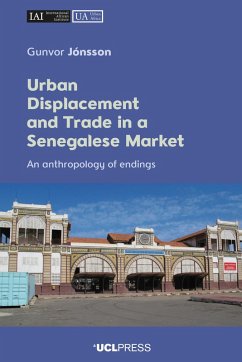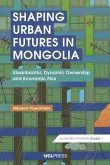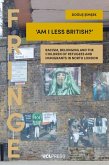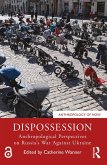The Malian market at the railway terminus in Dakar was bulldozed in 2009 and, following privatisation of the railway, passenger services in Senegal soon ceased altogether. The consequences were felt especially by women traders who had travelled the line since its inauguration, making the terminus in Dakar the centre of a thriving network of traders and migrants. To examine the fates of those whose livelihoods were destroyed or disrupted, Gunvor Jónsson spent a year with the women evicted from the terminus.
Urban Displacement and Trade in a Senegalese Market explores what happens at 'the end' of urban displacement, when it is all over, so to speak - when the dust has settled and people find themselves scattered in sometimes unfamiliar surroundings, trying to pick up the pieces and create something meaningful.
This book argues that rupture and ensuing displacement do not produce a clean slate where identities, networks and histories must be produced from scratch. Traders and their markets do not simply vanish into thin air when they are evicted. The book examines not only what is lost but what emerges when a dense node, such as the terminus, is dissolved and fragmented. The ethnography of the traders reveals that the aftermath of eviction in cities may lead to diasporic forms of consciousness and identity formations. Displacement, whether on a local or global scale, demands difficult adjustments and people's capacities to adapt to new circumstances and environments vary. This book uncovers some of these different capacities and variations in traders' reactions to displacement.
Praise for Urban Displacement and Trade in a Senegalese Market
'Jónsson's book is a masterful study of the aftermath of displacement in a major African city. Through deep ethnographic engagement, the book shows how displacement is about more than leaving a place; it is also about how people rebuild livelihoods, and how the space left behind continues to haunt their imagination of a meaningful life.'
Hélène Neveu Kringelbach, Associate Professor of African Anthropology, UCL
'This book is an inspiring tribute to the Malian women traders of Senegal. 'Emptied out' from their old market stalls by a vainglorious development scheme, they bravely regrouped to recover their livelihoods and protect their families. Gunvor Jónsson challenges the idea that displacement only involves refugees. Instead, she creatively marries studies of migration and urbanization, providing fresh insights to both fields.'
Robin Cohen, Professor Emeritus, University of Oxford
Urban Displacement and Trade in a Senegalese Market explores what happens at 'the end' of urban displacement, when it is all over, so to speak - when the dust has settled and people find themselves scattered in sometimes unfamiliar surroundings, trying to pick up the pieces and create something meaningful.
This book argues that rupture and ensuing displacement do not produce a clean slate where identities, networks and histories must be produced from scratch. Traders and their markets do not simply vanish into thin air when they are evicted. The book examines not only what is lost but what emerges when a dense node, such as the terminus, is dissolved and fragmented. The ethnography of the traders reveals that the aftermath of eviction in cities may lead to diasporic forms of consciousness and identity formations. Displacement, whether on a local or global scale, demands difficult adjustments and people's capacities to adapt to new circumstances and environments vary. This book uncovers some of these different capacities and variations in traders' reactions to displacement.
Praise for Urban Displacement and Trade in a Senegalese Market
'Jónsson's book is a masterful study of the aftermath of displacement in a major African city. Through deep ethnographic engagement, the book shows how displacement is about more than leaving a place; it is also about how people rebuild livelihoods, and how the space left behind continues to haunt their imagination of a meaningful life.'
Hélène Neveu Kringelbach, Associate Professor of African Anthropology, UCL
'This book is an inspiring tribute to the Malian women traders of Senegal. 'Emptied out' from their old market stalls by a vainglorious development scheme, they bravely regrouped to recover their livelihoods and protect their families. Gunvor Jónsson challenges the idea that displacement only involves refugees. Instead, she creatively marries studies of migration and urbanization, providing fresh insights to both fields.'
Robin Cohen, Professor Emeritus, University of Oxford
Dieser Download kann aus rechtlichen Gründen nur mit Rechnungsadresse in A, D ausgeliefert werden.









